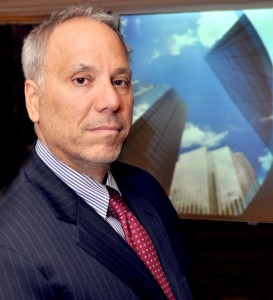 Real estate crowdfunding platforms are growing at a dizzying pace.
Real estate crowdfunding platforms are growing at a dizzying pace.
Observers estimate that there are now well over a hundred crowdfunding platforms — websites that raise money for development projects from everyday investors— that are based in the U.S. and specialize in real estate.
“When we first had industry meetings three years ago, real estate wasn’t even on the horizon,” said Richard Swart, a research scholar at UC Berkeley’s Haas School of Business who specializes in crowdfunding. “We were all surprised by how quickly the real estate space has grown.”
And even though it’s still young, real estate crowdfunding is on the brink of another transformation.
It’s been nearly two years since Title II of the U.S. JOBS Act, which legalized online solicitation of private investments from accredited investors, took effect.
Now crowdfunders are not only turning to accredited investors — defined as individuals or households with an annual individual income over $200,000, joint income over $300,000 or a net worth of more than $1 million — but also to institutions to raise cash.
And business models are rapidly changing to adapt to the new landscape.
This month, TRD looked at most high-profile players based in New York or with a significant presence here, to get a sense of which companies are blazing the trail for what has become one of the hottest investment vehicles in the industry.
Quantifying the sector is difficult, both because most crowdfunding offerings are only available to accredited investors and because crowdfunding platforms are not required to reveal how much capital they’ve raised. But below are some of the companies making waves in the sector, roughly ordered based on their prominence.
Fundrise
Capital raised for projects: $60 million
Venture funding raised: $41 million
Founded in 2010 by brothers Ben and Dan Miller, Fundrise was the first functioning real estate online crowdfunding platform in the U.S. And as a result, it’s more of a household name, at least in the industry, than many of its rivals.

Dan Miller
In New York, the company claims to have invested in just under $30 million in deals, including bonds for Silverstein Properties’ 3 World Trade Center, which it bought on the secondary market, as well as smaller projects in Harlem and Brooklyn.
It has also pioneered the practice of pre-funding deals — guaranteeing developers or real estate investors a loan upfront with its own money, and then taking that deal out to the so-called “crowd.”
Unlike some competitors, Fundrise has the cash reserves and big-money backers to do that. The firm has raised a total of $41 million in venture capital funding from investors, including Silverstein Properties’ Marty Burger and Tal Kerret and Ackman-Ziff Real Estate Group.
Dan Miller told TRD that the firm began to pre-fund because it was seeing a “huge jump in volume and quality” of deals and felt fully confident in its ability to raise future cash.
The company, which has long focused on funding the acquisition and development of urban multifamily and mixed-use properties with sums around $1 million, is now going after much larger deals.
For two of its current projects, one in Brooklyn and one in Atlanta, Fundrise is raising $10.5 million and $15 million, Miller said. In addition to everyday investors, Fundrise, like many of its competitors, allows institutional players to invest through its website. And those institutional players now provide more than half of the funds for Fundrise’s larger deals.
Silverstein’s Marty Burger said Fundrise’s deal size has grown significantly year-over-year.
“Two years ago it was half a million, last year it was a million,” Burger said at TRD’s New Development Forum & Showcase in May. “It’s only a matter of time before it’s tens and hundreds of millions. That’s the quality of this investor base.”
Prodigy Network
Capital raised for projects: $106 million
Venture funding raised: n/a
Prodigy Network is an outlier among U.S. crowdfunders. It is the only major platform that also develops all of the projects it raises cash for.

Rodrigo Niño
In addition, unlike its rivals, it raises most of its money abroad —with a sizable chunk coming from South America. Plus, it only raises equity, and it finances sizable deals that most other platforms haven’t dared touch.
Launched in Miami by Colombia native Rodrigo Niño in 2003, it started as a new development marketing company. But it began U.S. crowdfunding in 2012, when it went into contract to buy the office building 84 William Street, for which it raised more than $40 million. That building is now under construction as extended-stay hotel AKA Wall Street.
The firm since bought 17 John Street in Lower Manhattan, which it’s turning into co-working spaces and short-term rentals, and the AKA United Nations at 234 East 46th Street, for which it claims to have raised $32 million and $12 million, respectively. While Prodigy and its partners raise the equity for its projects from the crowd, they finance the bulk of those projects’ costs through loans from banks such as CIBC and Deutsche Bank.
In May, Prodigy went into contract to buy two former Ring portfolio buildings, 114 East 25th Street and 331 Park Avenue South, from MetroLoft for a combined $100 million, for which it plans to raise a combined $45 million from the crowd. As with 17 John Street, Prodigy plans to turn both properties into combined co-working and shared-living spaces. That puts Prodigy at the forefront of two of the hottest trends in New York real estate: shared spaces and crowdfunding.
Unlike many of its peers, Prodigy has not yet allowed institutions to invest equity in its projects, but that may change.
“We are in conversations to team up in a way that makes sense,” Niño said.
Carlton Accredited Crowdfunding
Capital raised for projects: $150 million
Venture funding raised: n/a
According to its own numbers, the Carlton Group’s crowdfunding platform has raised more money for projects than any of its peers. But so far, this is crowdfunding without a crowd.

Howard Michaels
The company, an international investment-banking firm that raises equity for large transactions, raised $150 million since launching its crowdfunding platform in April 2014. But that money came from only two wealthy investors, according to Carlton’s Chairman Howard Michaels, who declined to name them.
Moreover, Michaels explained that while those investors looked at the projects they’d be financing online, he met them at a crowdfunding conference and closed the financing in a more traditional manner — with phone calls and site visits.
So while Carlton is taking advantage of the JOBS Act, the firm isn’t crowdfunding in the strictest sense: raising small sums from lots of investors.
But that is about to change. Indeed, while many crowdfunding platforms are opening the doors to more institutional investors, Carlton is moving in the opposite direction.
Within the next month, Carlton plans to launch a re-designed website and lower its individual investment minimum to $25,000, from the current $1 million.
“The reason we went into crowdfunding is the widened scope of people that can access our transactions,” Michaels said, adding that he hopes lowering the investment minimum will give retail investors greater access — while also opening up a new investor base for Carlton.
iFunding
Capital raised for projects: $30 million
Venture funding raised: $4 million
New York-based iFunding has arguably made the most dramatic strategy shift of all its crowdfunding rivals.
In effect, the firm is moving away from a traditional crowdfunding model and becoming more of a technology-based conduit between institutions — with some participation from the crowd.
Founded in 2012 by former business consultant and investment banker William Skelley and former investment banking analyst Sohin Shah, the platform until now focused on funding the development and acquisition of both commercial and residential properties across the country. It claimed to be the largest U.S. crowdfunder by deal volume in early 2014, with a total of more than $20 million raised for deals. To-date, it claims to have raised $13 million for projects in New York alone.
But in the first quarter of last year, one of its deals unraveled.
The firm set out to fund a portion of a $250 million, 250,000-square-foot condo tower at 90-94 Fulton Street in Lower Manhattan to be developed by the Mavrix Group. But the deal fell apart over disagreements between Mavrix and a potential development partner over control of the project, according to Skelley.
Skelley explained he eventually realized the old business model of originating loans with the help of technology wasn’t going to work in the long run.
“I don’t think you can create an algorithm and scale a business originating and underwriting deals yourselves,” he said, in effect dismissing a core notion of crowdfunding.
Instead, the firm no longer originates loans, but simply buys them from institutional lenders looking for cash, and then passes them on to the crowd and, increasingly, other institutional players.
Patch of Land
Capital raised for projects: $24 million
Venture funding raised: $25 million
California-based Patch of Land has so far focused on funding small fix-and-flip loans for single-family residential buildings nationally, but it, too, is in the midst of a transformation. The company is now beginning to go after institutional backing as a way to land larger and more diverse deals, and is also looking to fund more projects in New York.
Jason Fritton, who co-founded the firm in 2012 with his brother Brian Fritton and partner Carlo Tabibi, said while Patch of Land started out with a focus on “residential value-add,” it is evolving.
“[We] are now working to become more of a holistic commercial lender,” Fritton said.
Currently, most of its loans are under $400,000 and carry one-year terms for borrowers and investors, but Fritton said the firm will start issuing larger loans with more than three-year turnarounds for both commercial properties and larger multifamily buildings. The company, he said, currently has $50 million worth of projects in the pipeline, including several in New York City, which have not yet been made public.
The firm’s recent expansion was powered in no small part by the institutional investors it’s already captured. Last year, it secured a $25 million commitment from a hedge fund, according to Fritton, who also said that he is currently in negotiations with 14 other institutional players.
Sharestates
Capital raised for projects: $11 million
Venture funding raised: n/a
Long Island-based Sharestates, which launched in 2013, has a business model similar to Patch of Land: it finances fix-and-flip loans with an average value of $350,000.

Sharestates founders Radni Davoodi, Allen Shayanfekr and Raymond Davoodi
So far, the firm, founded by title insurance veterans Allen Shayanfekr, Radni Davoodi and Raymond Davoodi of the Atlantis Organization, has raised $11 million from the crowd for 25 projects.
But that number soon could increase dramatically. The firm is planning to add another $10 million worth of deals by the end of this month.
In May, the startup launched a partnership with the Texas-based Ranger Direct Lending Fund, which will commit up to $30 million to pre-fund Sharestates’ deals.
“In our view, Sharestates is one of the most promising real estate platforms in the direct lending industry,” Ranger executive Bill Kassul said in a statement at the time. Kassul was not available to be interviewed for this story.
CityFunders
Capital raised for projects: n/a
Venture funding raised: $1 million
The latest addition to New York’s crowdfunding field, CityFunders launched in June.

David Behin
Its founders are David Behin, of brokerage MNS, his brother Albert, as well Jerry Swartz and Ayush Kapahi of capital markets brokerage HKS Capital Partners. The startup made a notable entrance: one of its inaugural offerings is a $1 million equity slice in Simon Baron Development’s 467-unit rental development at 29-26 Northern Boulevard in Long Island City.
“We thought it was really a great deal,” said David Behin, explaining that the project’s land cost basis is favorable because Baron bought the site a year ago, when prices were far lower. “Investors want to be in this type of project.”
Being late to the game, CityFunders was able to skip a few steps in platform development. Rather than start exclusively with small projects, it jumped straight to skyscraper financing. It is also pre-funding its deals right out of the gate, with the help of a $40 million credit line provided by high-net-worth backers, whom the firm declined to name. The minimum individual investment is $5,000.
Invest Thor
Capital raised for projects: n/a
Venture funding raised: n/a
Little is known about the crowdfunding venture that Joe Sitt’s Thor Equities is preparing to launch.
“Invest Thor, it’s going to be called,” Thor CFO Michael Schurer revealed on May 14 during a panel discussion hosted by the tax-advisory firm WeiserMazars.
Thor declined to comment on its plans.

Invest Thor founder Joe Sitt; Cityfunders Founders David Behin and Albert Behin
If and when it does launch, however, it could have an enormous impact on the crowdfunding field. For starters, Thor is one of the biggest real estate investors in New York City.
The private fund manager bought $2.8 billion worth of New York properties last year alone, meaning if it launches, its crowd investors could have access to an asset pool far larger than other crowdfunding platform in the game.
But more importantly, Thor would be the first major real estate investor and developer to launch its own crowdfunding division. With the exception of Prodigy, all of the other major crowdfunding platforms are run by entrepreneurs or capital markets brokers, acting as middlemen between developers and investors.
Thor could upend that model.
By the looks of it, Thor’s platform would cut out the middleman entirely and tap directly into the crowd. If others follow suit, the crowdfunding field could see its next big transformation.
Gabriel Silverstein, head of investment banking and advisory firm Angelic Real Estate, said he thinks more will follow in Sitt’s footsteps.
“I think personally the coming of age deal for a crowdfunding was the Silverstein WTC bond deal that Fundrise did,” he said. “It wasn’t a major piece of that deal, but it puts the credibility of crowdfunding very high with that level of sponsorship, that level of deal visibility, and that location and product.”
“Thor,” he added, “is one of many that will develop their own or private label crowdfunding platforms over the next few years.”
